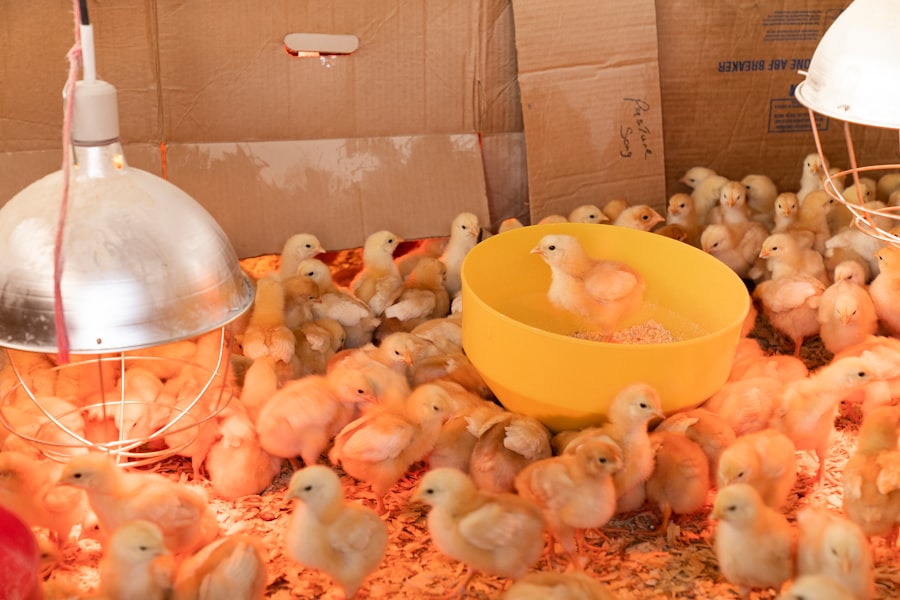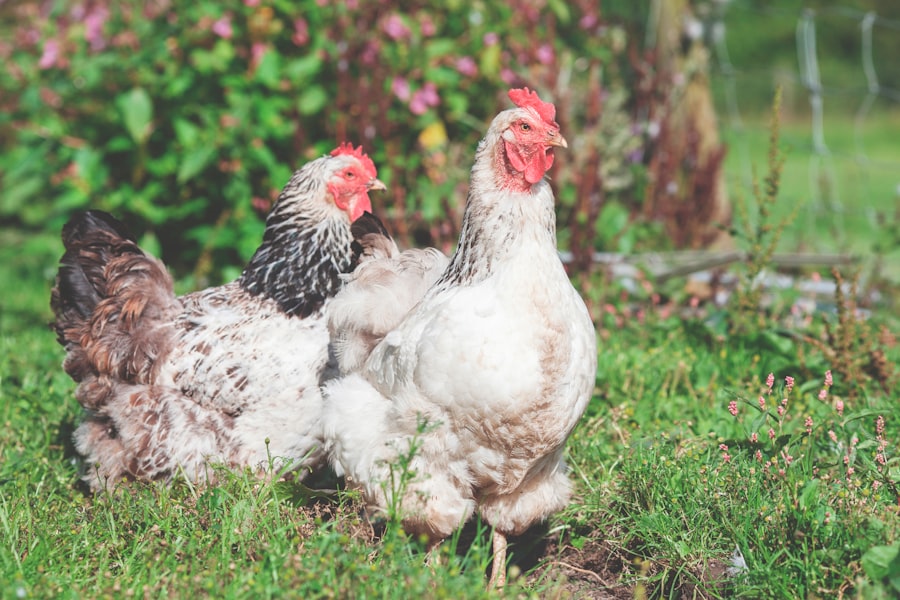Chickens are social creatures with a complex flock structure and unique communication methods among themselves and with humans. Comprehending chicken behavior is crucial for poultry keepers to avoid misunderstandings and conflicts. Chickens instinctively establish a hierarchical pecking order within their group, often engaging in dominance behaviors such as chasing, pecking, and fighting to determine their rank.
These birds possess a natural instinct to defend their territory and food sources, potentially becoming defensive or aggressive when perceiving threats to their resources. Chickens are also inherently curious, sometimes pursuing moving objects or people out of inquisitiveness. Recognizing these innate behaviors helps poultry keepers anticipate and mitigate potential issues with their birds.
Chickens demonstrate high intelligence and can form strong bonds with their human caretakers. They can learn to identify individual humans and may seek attention or treats from them. However, chickens may also become territorial and protective of their human caretakers if they sense a threat.
Understanding chicken behavior is essential for creating a harmonious and safe environment for both the birds and their human caretakers.
Table of Contents
- 1 Reasons Why Chickens May Chase Humans
- 2 How to React When Chickens Chase You
- 3 Tips for Preventing Chickens from Chasing You
- 4 The Importance of Establishing Boundaries with Chickens
- 5 Seeking Professional Help for Aggressive Chickens
- 6 Enjoying the Benefits of Keeping Chickens without Fear
- 7 FAQs
Key Takeaways
- Chickens have natural behaviors and instincts that may cause them to chase humans.
- Reasons for chickens chasing humans include establishing dominance, protecting their territory, or seeking attention.
- When chickens chase you, it’s important to remain calm, avoid running, and use assertive body language to establish boundaries.
- Prevent chickens from chasing you by providing them with enough space, avoiding sudden movements, and using positive reinforcement training.
- Establishing boundaries with chickens is important for their well-being and for creating a harmonious relationship with them.
- Seek professional help if you are unable to manage aggressive chicken behavior on your own.
- Enjoy the benefits of keeping chickens by understanding their behavior and taking proactive steps to prevent aggression.
Reasons Why Chickens May Chase Humans
Establishing Dominance
One common reason for chickens to chase humans is due to their natural instinct to establish dominance within their flock. If a chicken perceives a human as a lower-ranking member of the flock, they may engage in dominance behaviors such as chasing or pecking to assert their authority. This behavior is more common in roosters, who are naturally inclined to establish themselves as the leader of the flock.
Protecting Territory and Resources
Another reason why chickens may chase humans is due to their natural instinct to protect their territory and resources. If a chicken feels that their space or food source is being threatened by a human, they may become defensive and chase them away. This behavior is more common in free-range chickens who have a larger territory to protect.
Curiosity and Attention-Seeking
Chickens may also chase humans out of curiosity or in search of attention or treats. Chickens are naturally curious animals and may be attracted to moving objects or people. They may also learn that chasing humans can result in getting attention or treats, which can reinforce this behavior.
Differentiating Between Playful and Aggressive Behavior
It’s important to note that not all instances of chickens chasing humans are aggressive in nature. Sometimes, chickens may simply be trying to communicate with humans or engage in playful behavior. However, it’s crucial for chicken keepers to be able to differentiate between playful chasing and aggressive behavior in order to address any potential issues.
How to React When Chickens Chase You

When faced with a situation where chickens are chasing you, it’s important to remain calm and react appropriately to prevent escalating the situation. One of the most important things to remember is to avoid running away from the chickens. Running can trigger a predator-prey response in chickens, causing them to chase after you even more.
Instead, it’s best to stand still and avoid making sudden movements. If a chicken does approach you aggressively, it’s important to assert yourself as the dominant figure without being aggressive towards the chicken. This can be done by using a confident posture, making yourself appear larger by standing tall, and using a firm but calm voice to discourage the chicken from approaching further.
It’s also important to avoid making direct eye contact with the chicken, as this can be perceived as a threat. Instead, try to turn your body slightly away from the chicken and avoid staring directly at them. If the situation becomes too intense or if you feel threatened by the chickens, slowly back away from them without turning your back on them.
Once you have created some distance between yourself and the chickens, you can slowly and calmly leave the area. Overall, remaining calm, avoiding sudden movements, and asserting yourself as the dominant figure without being aggressive are key strategies for reacting when chickens chase you.
Tips for Preventing Chickens from Chasing You
Preventing chickens from chasing you starts with understanding their behavior and taking proactive measures to create a harmonious environment for both the chickens and their human caretakers. One effective way to prevent chickens from chasing you is by establishing yourself as the dominant figure within the flock. This can be done by consistently using confident body language and voice when interacting with the chickens.
Another important tip is to avoid encouraging chasing behavior in chickens. This means not running away from them or engaging in playful chasing games that can reinforce this behavior. Instead, focus on positive interactions with the chickens that encourage respectful behavior.
Providing an enriching environment for the chickens can also help prevent chasing behavior. This includes ensuring that they have enough space, access to food and water, and opportunities for mental stimulation. A well-structured environment can help reduce stress and prevent territorial or defensive behaviors in chickens.
Consistent training and positive reinforcement can also be effective in preventing chasing behavior in chickens. By rewarding desirable behaviors and redirecting undesirable behaviors, you can help shape the chickens’ behavior in a positive way. Lastly, it’s important to be mindful of your own behavior around the chickens.
Avoid making sudden movements or loud noises that can startle them, as this can trigger defensive or aggressive responses. By taking these proactive measures, you can help prevent chickens from chasing you and create a safe and harmonious environment for both the chickens and their human caretakers.
The Importance of Establishing Boundaries with Chickens
Establishing boundaries with chickens is crucial for creating a respectful and safe relationship between the birds and their human caretakers. Boundaries help define what behaviors are acceptable and what behaviors are not, which is essential for preventing potential conflicts or misunderstandings. One way to establish boundaries with chickens is by setting clear rules for interactions with them.
This can include rules about handling, feeding, and entering their space. By consistently enforcing these rules, you can help the chickens understand what is expected of them and what is not allowed. Consistent training and positive reinforcement are also important for establishing boundaries with chickens.
By rewarding desirable behaviors and redirecting undesirable behaviors, you can help shape the chickens’ behavior in a positive way. It’s also important to be mindful of your own body language and behavior around the chickens. Using confident body language and voice can help establish yourself as the dominant figure within the flock, which can help prevent potential conflicts.
Creating a structured environment for the chickens can also help establish boundaries. This includes providing them with a secure coop or shelter, designated feeding areas, and clear boundaries for free-ranging activities. Overall, establishing boundaries with chickens is essential for creating a harmonious and respectful relationship between the birds and their human caretakers.
Seeking Professional Help for Aggressive Chickens

Identifying Underlying Health Issues
In some cases, aggressive behavior in chickens may require professional intervention to address underlying issues and prevent potential conflicts. If you are experiencing persistent aggression from your chickens despite taking proactive measures to prevent it, seeking professional help from a veterinarian or animal behaviorist may be necessary. A veterinarian can help rule out any underlying health issues that may be contributing to aggressive behavior in chickens.
Expert Guidance on Nutrition, Parasite Control, and Health Management
They can also provide guidance on proper nutrition, parasite control, and overall health management for the birds. An animal behaviorist can provide valuable insights into the root causes of aggressive behavior in chickens and offer tailored solutions for addressing these issues. They can assess the chickens’ environment, social dynamics within the flock, and interactions with their human caretakers to identify potential triggers for aggression.
Specialized Help for Aggressive Roosters
Professional help may also be necessary if you are dealing with aggressive roosters, as they require specialized handling and management techniques. Roosters have natural instincts to establish dominance within their flock, which can lead to aggressive behaviors if not managed properly. Overall, seeking professional help for aggressive chickens can provide valuable support in addressing underlying issues and creating a safe and harmonious environment for both the birds and their human caretakers.
Enjoying the Benefits of Keeping Chickens without Fear
Despite the potential challenges of dealing with aggressive behavior in chickens, there are numerous benefits to keeping these birds that can be enjoyed without fear. Chickens are not only a sustainable source of fresh eggs but also provide natural pest control in the garden by eating insects and weeds. Chickens also have unique personalities and can be entertaining companions for their human caretakers.
They are social animals that enjoy interacting with each other and with humans, making them a delightful addition to any backyard or homestead. By taking proactive measures to understand chicken behavior, establish boundaries, and seek professional help if needed, you can create a safe and harmonious environment for both the chickens and their human caretakers. With proper care and management, you can enjoy the many benefits of keeping chickens without fear.
In conclusion, understanding chicken behavior is essential for anyone who keeps these birds. By recognizing the reasons why chickens may chase humans, reacting appropriately when faced with this behavior, taking proactive measures to prevent chasing, establishing boundaries with the birds, seeking professional help if needed, and enjoying the benefits of keeping chickens without fear, you can create a harmonious environment for both the birds and their human caretakers.
I recently read an interesting article on poultrywizard.com about turning a shed into a chicken coop. It provided some great tips on how to repurpose an existing structure to create a safe and comfortable home for chickens. It also discussed the importance of proper ventilation, lighting, and insulation for the coop. It was a helpful resource as I’ve been considering building a coop for my own flock of chickens.
FAQs
What are some reasons why chickens might chase people?
Chickens may chase people for a variety of reasons, including feeling threatened, protecting their territory, or seeking food.
How can someone prevent chickens from chasing them?
To prevent chickens from chasing you, avoid making sudden movements, maintain a calm demeanor, and avoid invading their space. Additionally, providing them with ample food and ensuring they feel secure in their environment can help reduce the likelihood of being chased.
Are there specific breeds of chickens that are more prone to chasing behavior?
Some chicken breeds, such as Rhode Island Reds and Leghorns, are known to be more assertive and may be more likely to exhibit chasing behavior. However, individual temperament and environmental factors also play a significant role.
What should someone do if they are being chased by chickens?
If you find yourself being chased by chickens, it’s important to remain calm and avoid running, as this can escalate the situation. Slowly back away from the chickens and try to create distance between yourself and the birds. If possible, seek shelter or a barrier to separate yourself from the chickens.
Meet Walter, the feathered-friend fanatic of Florida! Nestled in the sunshine state, Walter struts through life with his feathered companions, clucking his way to happiness. With a coop that’s fancier than a five-star hotel, he’s the Don Juan of the chicken world. When he’s not teaching his hens to do the cha-cha, you’ll find him in a heated debate with his prized rooster, Sir Clucks-a-Lot. Walter’s poultry passion is no yolk; he’s the sunny-side-up guy you never knew you needed in your flock of friends!







